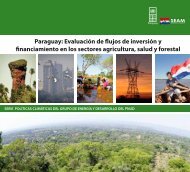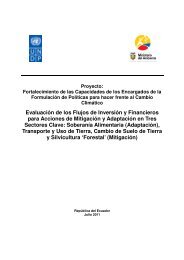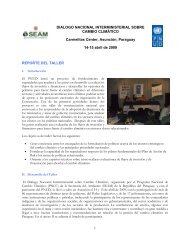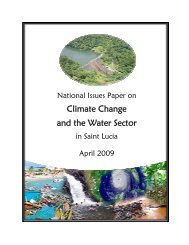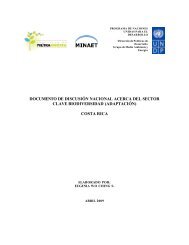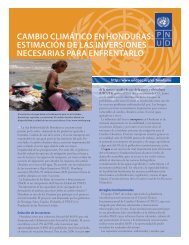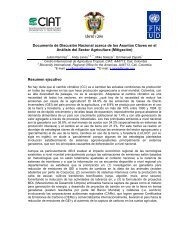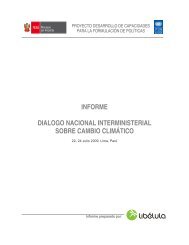View Publication - UNDPCC.org
View Publication - UNDPCC.org
View Publication - UNDPCC.org
Create successful ePaper yourself
Turn your PDF publications into a flip-book with our unique Google optimized e-Paper software.
11 Cannady — Access to Climate Change Technology by Developing Countries: A Practical Strategy<br />
patent claim against the member, whether<br />
or not related to sustainable development,<br />
the licence will be subject to “defensive<br />
termination”. In other words, a non-pledger<br />
who wishes to use a single patent in the pool<br />
must “pay” by granting free a licence to all of<br />
its patents. Members will be terminated only if<br />
they assert a patent against another member<br />
that is in the patent classes identified for the<br />
sustainable development pool. 43<br />
The attractive part of the WBCSD pool is that<br />
the patents are licensed royalty-free. The less<br />
attractive part is that the pool itself is small<br />
(around 80 patents appear on the web listing)<br />
and that non-members can be cut off for making<br />
claims against a member whether or not the<br />
claim is related to sustainable development.<br />
Also, the patents listed are not necessarily filed<br />
and protected in developing countries, and so<br />
the value add of the pool is limited.<br />
Most importantly, the WBCSD pool does not<br />
confer any rights to know-how, trade secrets<br />
or documentation. Although theoretically<br />
patents should enable a person skilled in<br />
the art to practise the invention, in practice<br />
the details concern only the specific claims<br />
of the patent. Useful technology transfer<br />
generally requires a set of patents and other<br />
IP, plus documentation and sharing of knowhow.<br />
This is usually done between businesses<br />
in development collaboration agreements,<br />
where the IP licence is incorporated but is<br />
only one element of value in the transaction.<br />
The WBCSD website points out that members<br />
may be willing to enter into collaboration<br />
agreements, but the problem of lack of<br />
bargaining power is likely to arise in the<br />
negotiation for collaborative development<br />
for any developing country party that is<br />
without capital, IP assets or something else<br />
to offer.<br />
2.3.5 Summary<br />
In sum, relying on patent pools as a way to<br />
access climate change technology has the<br />
following limits:<br />
• Pool licences may be open but they are<br />
generally not free. Even a “reasonable<br />
royalty” for use of an energy technology<br />
portfolio owned by wealthy country<br />
parties adds a cost burden. Developing<br />
country research institutions and<br />
companies could be saddled with a tax<br />
(a royalty) on their own development<br />
and commercialization of energy<br />
technologies.<br />
• The pool licence is often intended to clear<br />
IP hurdles between owners of IP, not to<br />
deliver technology to non-owners, and so<br />
is devoid of documentation, instruction<br />
and know-how. The financial and other<br />
terms of collaboration agreements and<br />
technology licences must be negotiated<br />
for useful technology transfer.<br />
• Pool licences do not eliminate inequality<br />
in bargaining power, and what is a<br />
“reasonable royalty” must be negotiated,<br />
just as such terms must be negotiated in<br />
non-pool collaboration agreements and<br />
technology licences.<br />
• Pools may offer licences to patents that<br />
developing countries can use anyway,<br />
because the patent owners often do not<br />
file there.<br />
• Pools help patent owners to create a<br />
large powerful patent portfolio that<br />
increases their patent power and could<br />
be used for enforcement against weak<br />
developing country parties.<br />
• Pools that require contribution of technology<br />
risk unprotected disclosure<br />
of endo-genous developing country<br />
technology, which may diminish<br />
developing country party control over<br />
these technologies and the value they<br />
can extract from them.<br />
• The pool in climate change context is<br />
unlinked to any technical standard, and




